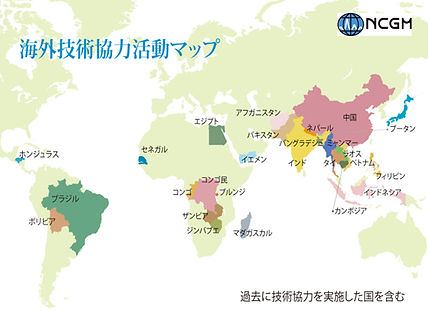Partnership with the National Center for Global Health and Medicine

Joint Graduate School
Bureau of International Health Cooperation, the National Center for Global Health and Medicine (NCGM)
Nagasaki University and the Bureau of International Health Cooperation, the National Center for Global Health and Medicine (NCGM) are committed to our academic partnership together. The Joint Graduate School between Nagasaki University and the NCGM will work to strengthen our relationship initiated by the School’s predecessor, The Graduate School of International Health Development.
The Joint Graduate School aims to expand the range of educational and research activities taking place, increase the students’ choices for studies, and promote professional development of students by conducting research and education based on cooperation between the International Health Development course, which trains people who are specialized in public health so that they can be active internationally, and the NCGM, which conducts many research-related projects overseas involving international cooperation.
The defining characteristic of this joint graduate school is that students participate in long-term internships and conduct research in developing countries for eight months during their second year. This joint graduate school is expected to promote project studies in the programs operated by the Bureau of International Health Cooperation.
About the Bureau of International Health Cooperation
We support various projects to improve health care in developing countries. There are a number of countries in the world where people cannot receive adequate health care due to poverty. Pregnancies and childbirth often remain risky and people die young due to preventable or treatable infectious diseases. We assist developing countries mainly in the fields of maternal and child health, infectious disease control, and health system improvements in order to prevent life-threatening diseases.
Since our founding in 1986, we have worked as a leading Japanese international cooperation agency in the health sector in cooperation with the Ministry of Health, Labour and Welfare, the Ministry of Foreign Affairs, Japan International Cooperation Agency (JICA), and the World Health Organization (WHO). In the spirit of international cooperation, we sending experts to join technical cooperation projects in developing countries, training health personnels domestically and abroad, while conducting health research. In addition, we have been sending medical relief teams to many parts of the world in response to natural disasters and pandemics of communicable disease.
We aim to allow people of all countries to live healthy lives without exception. Therefore, at the Bureau of International Medical Cooperation, under the motto of “Care, Commitment and Communication for a Healthier World”, we promote high-quality international cooperation that combines strategy and dignity.
[Partially quoted from the NCGM website]
Technical cooperation by the NCGM
The Bureau of International Health Cooperation sends public health specialists, doctors, nurses, midwives, and other medical professionals to technical cooperation projects, established between Japan and other counties through joint conferences, with the aim of solving issues related to medical health issues in developing countries.
There are various types of technical cooperation, for example projects that strengthen the medical system needed by people in developing nations projects that to sufficiently train doctors, nurses, midwives, and other healthcare professionals, and projects that disseminate technology to prevent infectious diseases.
Specialists do not provide direct medical services. Instead, as advisers, they determine specific issues for the governments of the partner countries or persons in charge of healthcare centers, develop solutions for such issues, and work to improve the public health environment of the entire nation by passing on necessary skills and knowledge. Respect for the leadership of the partner countries is emphasized to ensure that technical cooperation achievements continue in developing nations.





